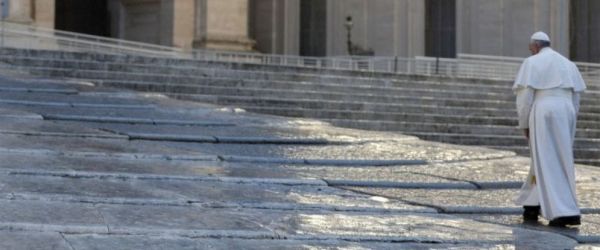In today’s Gospel (cf. Mt 10:26-33) the Lord Jesus, after having called and sent the disciples on mission, teaches them and prepares them to face the trials and persecutions they will have to endure. Going on mission is not like tourism, and Jesus cautions them: “you will find persecutions”. So he exhorts them: “have no fear of them; for nothing is covered that will not be revealed.... What I tell you in the dark, utter in the light.... And do not fear those who kill the body but cannot kill the soul” (vv. 26-28). They can only kill the body; they do not have the power to kill souls: do not fear this. Jesus’ dispatch [of the disciples] on mission does not guarantee their success, just as it does not protect them from failure and suffering. They have to take into account both the possibility of rejection and that of persecution. This is somewhat frightening but it is the truth.
The disciple is called to conform his life to Christ who was persecuted by men, knew rejection, abandonment and death on the cross. There is no Christian mission marked by tranquility! Difficulties and tribulations are part of the work of evangelization and we are called to find in them the opportunity to test the authenticity of our faith and of our relationship with Jesus. We must consider these difficulties as the opportunity to be even more missionary and to grow in that trust toward God, our Father who does not abandon his children during the storm. Amid the difficulties of Christian witness in the world, we are not forgotten but always assisted by the attentive concern of the Father. For this reason, in today’s Gospel, a good three times Jesus reassures the disciples, saying: “Do not fear!”.
Even in our day, brothers and sisters, persecution against Christians is present. We pray for our brothers and sisters who are persecuted and we praise God because, in spite of this, they continue to bear witness to their faith with courage and faithfulness. Their example helps us to not hesitate in taking the position in favour of Christ, bearing witness bravely in everyday situations, even in apparently peaceful contexts. In effect, a form of trial can also be the absence of hostility and tribulation. Besides [sending us out] as “sheep in the midst of wolves”, the Lord even in our times sends us out as sentinels in the midst of people who do not want to be woken from their worldly lethargy which ignores the Gospel’s words of Truth, building for themselves their own ephemeral truths. And if we go to or live in these contexts, and we proclaim the Words of the Gospel, this is bothersome and they will look at us unkindly.
But in all this, the Lord continues to tell us, as he did to the disciples of his time: “Do not fear!”. Let us not forget these words: always, when we experience any tribulation, any persecution, anything that causes us to suffer, let us listen to the voice of Jesus in our hearts: “Do not fear! Do not fear! Go Forth! I am with you!”. Do not fear those who mock you and mistreat you and do not fear those who ignore you or respect you “to your face”, but fight the Gospel “behind your back”. There are so many who smile to our face, but fight the Gospel behind our backs. We all know them. Jesus does not leave us all alone, because we are precious to him. That is why he does not leave us all alone. Each one of us is precious to Jesus and he accompanies us.
May the Virgin Mary, example of humility and courageous adherence to the Word of God, help us to understand that success does not count in the witness of faith, but rather faithfulness, faithfulness to Christ, recognizing in any circumstance even the most problematic, the inestimable gift of being his missionary disciples.
[Pope Francis, Angelus 25 June 2017]












